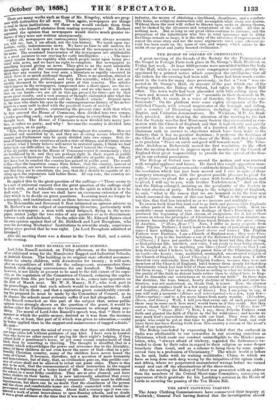LORD JOHN RUSSELL ON RAGGED SCHOOLS.
Lard John Russell assisted, on Friday afternoon, at the inauguration of an additional wing for the Manchester Ragged and Industrial Schools, at Ardwick Green. The building in its original state afforded accommo- dation for ninety children, with dormitories for twenty ; it will now, after an expenditure of 4300/, for the enlargement, accommodate three hundred, with sleeping conveniences for one hundred. The building, however, is not likely at present to be used to the full extent of its capa- city, as the regulation of the Committee of Council, reducing the capita- tion grants from 508. per head per annum to 58., comes into operation on the 31st of March next. Mr. W. N. Massey, M.P., who took part in the proceedings, said that such schools would be useless unless the chil- dren were fed in them ; and that a capitation grant considerably exceed- ing the proposed de. must be made by the Committee of Council, as in its absence the schools must seriously suffer if not fail altogether. Lord John Russell remarked on this part of the subject that, unless public Opinion were strongly shown on the question of the grant, it would be useless either for Parliament or the Government to attempt doing any- thing. The moral of Lord John Russell's speech was, that "there is no manner in which the public money, derived as it was from the incomes of all,—or, at least, that part of it which was given to education,—could be better applied than in the support and maintenance of ragged schools."
Re said—.
"It must press upon the mind of every one that there are children in all our large cities left without guidance of any Lind. I have seen in London boys who have no other means of paying for their night's lodging, if they cannot hold a gentleman's horse, or get some casual employment of that kind, than by resorting to thieving. The thought is dreadful, that in a country which acknowledges the power and reverence due to the Almighty, many of these children do not even know the name of God—that in a pro- fessedly Christian country, many of the children have never heard the name of Christ. It becomes, therefore, not a question of mere humanity and benevolence, but of duty, that, as civilization goes on, this prolific nur- sery of crime shall not be allowed to infest our great cities. There is this also to be said, that the commencement of their instruction in the ragged schoolsis a beginning of a better kind of life. Many of the children enter the school in a most filthy condition. They are at once cleaned, and have Defter clothes on their backs. It is now universally admitted that every branch of social improvement is closely connected. There must be different departments , but there can be no doubt that the cleanliness of the person and the cleau and comfortable home are closely connected with moral im- Insvement and religious instruction. About half a century ago it was con- red a work of great benevolence to open Sunday schools, and no doubt "Was a great advance at the time that it was made. But without habits of industry, the means of obtaining a livelihood, cleanliness, and a comfort- able home, no religious instruction will accomplish what every one desires. Without them the seed will either be thrown upon rocks or among thorns, and be choked by the pleasures and temptations of the world. All this is nothing new. But so long as our great cities continue to increase, and the proportion of the inhabitants who live in total ignorance and in filthy dwellings remain as large, it is the duty of the advocates of improvement to repeat the same story and use the same arguments until some efficient in- road has been made on the mass of vice and misery which exists in the midst of our great and justly boasted civilization."


























 Previous page
Previous page